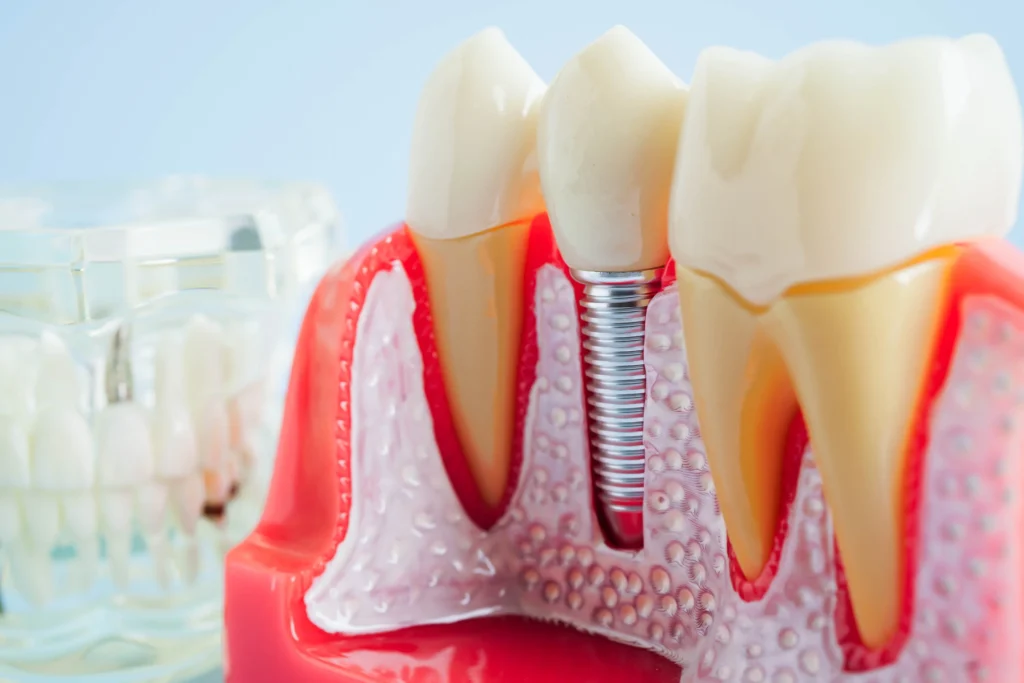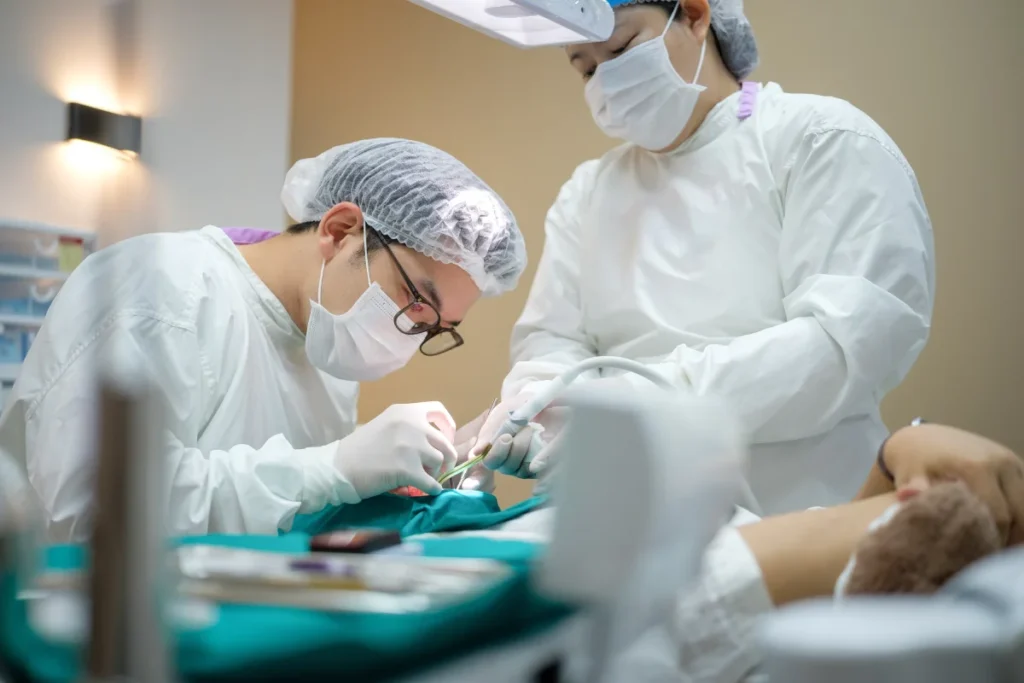
In addition to replacing a missing tooth, dental implants maintain the overall structure of your face and jawbone. This is because implants take root onto bone, allowing the bone to grow and ossify around the implant, preventing sagging.
However, it’s also for this reason that dental implant procedures are some of the most complex procedures your dentist can perform. They can be equally cumbersome for you, the patient, if you’re unsure of what to expect.
Before you jump into the dental implant procedure, you’ll want to know how to prepare for dental implant surgery the right way. A little preparation goes a long way in ensuring a successful surgery and smooth recovery.
In this guide, we’ll go through how to prepare for the dreaded implant surgery and how you can manage your post-surgical woes.
Key Takeaways
- Dental implant surgery replaces missing teeth with artificial roots that fuse with your jawbone, helping restore both function and appearance.
- Preparation is crucial. From scheduling time off work to following fasting and rest instructions from your dentist.
- X-rays, impressions, and honest medical disclosures help your dentist plan a safe and precise surgical procedure for you.
- Post-surgery recovery involves rest, soft foods, gentle hygiene, and avoiding strenuous activities until fully healed.
- Following your dentist’s advice ensures the implant heals properly, setting the stage for a long-lasting, natural-looking smile.
What is Dental Implant Surgery
In a dental implant procedure, your dentist replaces missing teeth by anchoring artificial teeth to your jawbone. This is done with artificial tooth roots, typically made of titanium.
These roots, known as dental implants, are then fitted with artificial teeth that look and function just like your natural teeth.
A dental implant procedure involves three key stages:
- Dental implant surgery. This is the procedure where dentists drill into the patient’s jaw and insert a titanium implant. This implant will serve as the anchor, the root of the artificial tooth. Throughout the dental implant procedure, dental implant surgery is the stage most patients worry about, and hence, what we’ll be discussing throughout this guide.
- Osseointegration. Once the titanium implant is seated onto the patient’s jawbone, the dentist allows the patient’s bone to harden and grow around the implant, providing a sturdy structure for the artificial tooth. This can take up to six months.
- Crown fitting. Once the bone is fully hardened, dentists outfit the implant with a crown, which becomes the patient’s new tooth.
Since implant surgery involves an oral surgeon drilling into the patient’s jawbone, implant dentistry could be taxing to someone with a weak bone structure.
It’s ideal for patients to wait until they reach their mid-twenties before undergoing a dental implant procedure, as this is the stage at which the jawbone is fully developed.
How do Dental Implants Differ from Other Restorative Options

Restorative options, such as crowns and bridges, rely on your existing oral structure, such as your gums and existing teeth, to anchor themselves in your mouth.
Implants, on the other hand, fuse directly with your jawbone.
This means dental implants feel and function almost like your natural teeth, and are excellent options for edentulous patients (patients who have multiple missing teeth or no teeth at all).
They also help preserve your bone structure and prevent facial sagging, which is something other tooth replacement options can’t always guarantee.
Preparing for Dental Implant Surgery
Oral surgery anxiety can begin to kick in as the day of the procedure nears.
Preparing for that rather dreaded day will lighten your woes and make your post-surgery habits much smoother to ease into.
Set your Sick Days from Work
You’d want to prepare for two sets of sick days from work:
- Set a sick day for the appointment before surgery. During this appointment, the dentist will assess your medical history and lifestyle, take an X-ray of your bone, and make an impression of your existing teeth. This helps the dentist with surgery planning.
- Set sick days encompassing the day of surgery and your recovery period. Allow 3-5 days of recovery before coming back to work. You’ll need this time for the wound to heal, giving you the adequate comfort you’ll need at work. Do note, though, that full recovery of the surgical wound takes up to two weeks.
You’d want to make setting sick days your first priority, especially if the approval process for paid leave at your company is tedious and not guaranteed.
Dentist will Take Your X-ray and Dental Impressions Prior to Surgery Day
Your oral surgeon will take X-rays and oral impressions to study your bone structure and existing bite.
This allows dentists to plan the angle of the implant relative to your oral anatomy. If there’s sufficient time and the case isn’t too complex, the dentist may perform implant surgery on the same day you walked in for an assessment.
With the oral impression they took, they can also fabricate the crown that will attach to the implant, harmonising the new artificial tooth with the rest of the bite.
Provide your Dentist with your Medical Background and Lifestyle
Be upfront about your medical history and any medical conditions.
Certain factors like diabetes and smoking can affect healing or slow down osseointegration. Your dental professional needs this information to plan around these conditions, creating a safe and customised implant procedure specific to you.
In some cases, an anesthesiologist may need this information to administer the IV sedation required for surgery.
Follow the Dentist’s Fasting Instructions
If your procedure involves IV sedation or general anaesthesia, your dentist’s instructions may include fasting before your appointment. This helps ensure a safe and effective experience under sedation.
Rest Well Before the Day of Surgery
The night before your dental implant surgery, get adequate sleep.
Being well-rested helps your body prepare for the surgical procedure. Much like how you’d want to be well-rested before a test or a sports competition event.
We understand some patients have trouble sleeping, especially the night before surgery. This is all the more reason we advise patients to refrain from coffee as the day of surgery nears.
Stock Up on Soft Foods
Once your implant is in place, your mouth will need time to heal.
That means you’ll need to eat soft foods — think soups, mashed potatoes, porridge, yogurt, or smoothies. These are gentle on your surgical site and help prevent irritation to your implant area.
Furthermore, exerting a great deal of effort while chewing can potentially move the implant around during osseointegration. Not only would soft food be easier on the wound, but this food also minimises the micro movements of the implant fixture exerted while chewing.
The angle at which your implant sits is carefully planned by the dentist. So micro-movements and deviation from this implant’s angle can alter the treatment plan your dentist has in place.
Get a Friend to Pick You Up From the Dentist’s Office
Driving under the influence of IV sedation isn’t a good idea.
If you’re having IV sedation, it’s best to ask a trusted friend or family member to bring you home after your dental implant appointment. You’ll likely feel groggy, so having a buddy ensures you get home safely.
What to Expect During Dental Implant Surgery

The surgical implant process is as follows:
- Your oral surgeon will start by making a small incision in the gum to access your jawbone.
- Then, they’ll drill into your jawbone at a precise, specified angle. At this point, they’ll place the artificial tooth root (the implant) into the bone.
- Depending on your medical background and lifestyle, your dentist may administer local anaesthesia or IV sedation to help you feel relaxed.
- In some cases, if your bone isn’t thick or strong enough, a bone graft may be required before implant placement to prevent wobbling.
- Once the implant is in, your gum will be stitched closed to protect the surgical site as it heals.
Your new artificial tooth won’t be fitted yet, however.
You’ll have to wait about 2-6 months for your jawbone to harden around the implant before the dentist fits you with a custom crown.
Until then, dentists place healing caps on the implants as a protective cover. They also act as a structure for gums to grow around. After surgery, you’ll wake up with an implant in your jaw and a metal cylinder (the healing cap) where your tooth used to be.
You’ll be sent home and spend the next six months growing bone around the implant. Your dentist will notify you when your crown is ready.
Post-Surgery Care and Recovery
After your implant surgery, your dentist will guide you through the recovery process. Following their advice closely will help you avoid complications and ensure your implant area heals properly.
Take the Prescribed Medications and Antibiotics
You’ll be given, or perhaps prescribed, three primary medications:
- Antibiotics. These help keep infection at bay.
- Anti-inflammatories. These reduce swelling and discomfort around the site.
- Pain killers. These help make living with the site more manageable.
Always follow your dentist’s recommendations and complete the full course of medication to ensure a smooth recovery and maintain healthy oral health.
Watch Your Chewing Habits
Be mindful of what you eat. Stick to soft foods and avoid biting directly on the implant site as it heals. This helps reduce strain and lowers the chance of implant failure.
Avoid Strenuous Exercise
As tempting as it might be to hit the gym, avoid strenuous exercise for a few days after your implant surgery. Increased blood flow can cause bleeding at the surgical site, which may slow down the healing process.
Be Gentle With Your Hygiene
Continue brushing and rinsing, but do it gently around the implant.
A mild mouth rinse can help keep bacteria away while protecting your implant. Good hygiene is key to maintaining your long-term oral health.
Some dentists may prescribe antiseptic mouth rinses to keep the site clean.
Ready to restore your smile?
Getting dental implants restores mouth function and can allow edentulous patients to live normal lives. Just as if they’ve never lost their teeth.
By following these tips and your dentist’s instructions, you’ll be helping your dentist provide you with smooth, worry-free implant service.
MySmile Dental Group is fully equipped with facilities that can service complex implant cases. Whether you’re missing one tooth, multiple teeth, or all your teeth, we have the equipment and expertise to restore your smile to its former glory.
Frequently Asked Questions
How painful is dental implant surgery?
You won’t feel a thing, thanks to the advancements in anaesthetic dentistry. Though after surgery, some swelling and mild soreness will be expected. So before heading home, your dentist will prescribe pain medication to help manage it.
How long does it take to recover from dental implant surgery?
Initial healing usually takes about two weeks, but complete recovery, when the bone fully fuses with the implant, can take up to six months. During this time, your dentist may schedule check-ups to ensure everything is healing properly.
Can I go back to work the day after surgery?
No! Absolutely not. Surgery is physically taxing on the body, and your wound needs to recover. Though some people return to work immediately if their job isn’t physically demanding (e.g., work from home). You’d want to allow yourself 3-5 days’ rest before committing back to work.
What can I eat after getting dental implants?
Stick to soft foods for the first few days, such as soups, mashed potatoes, porridge, yogurt, and smoothies. Avoid crunchy, chewy, or hard foods that might put pressure on your implant site.
How long do dental implants last?
With regular brushing, flossing, and dental check-ups, implants can last 20 years or more. They’re designed to be a permanent solution that feels and functions like your natural teeth.
